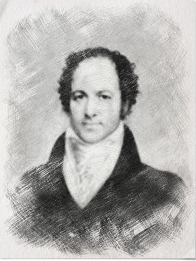“Power,” as American statesman Daniel Webster said two-hundred years ago during the Massachusetts Constitutional Convention, “naturally and necessarily property.” Yes, the political ballot is important, but if people do not have the economic power to back up political power, what inevitably happens is that those with property seize power, or those with power, seize property.
 |
| Benjamin Watkins Leigh |
As Benjamin Watkins Leigh noted, “Power and property can be separated for a time, but divorced, never. For as soon as the pangs of separation are felt, power will take over property, or property will take over power.” Henry C. Adams, speaking nearly a century after Webster and Leigh, concurred. As he said,
The broad theory of constitutional liberty is that the people have the right to govern themselves; but the historical fact is that, in the attempt to realize this theory, the actual control of public affairs has fallen into the hands of those who possess property. (Henry C. Adams, Public Debts, An Essay in the Science of Finance. New York: D. Appleton and Company, 1898, p. 9.)
That is why economic democracy is so important to the maintenance of political democracy. Nor do the people who waste time arguing about whether we have a democratic republic instead of a direct democracy doing themselves or anyone else any favors. The specific form of liberal democracy is irrelevant as long as it rests ultimately on the sovereignty of the human person under God, and not the collective as in socialism, or an élite as in capitalism.
Furthermore, no government can long stand that does not promote industry, commerce, and agriculture. That would be as contradictory and self-defeating as a government that fails to protect people’s natural rights to life, liberty, private property, and the acquisition and development of virtue (“pursuit of happiness”). The means of production are the means of sustaining life and liberty. This renders both of these two premier rights effectively meaningless without an adequate ownership stake — private property — in whatever industry, commerce, or agriculture provides subsistence for people.
 |
| Daniel Webster |
Nor do industry, commerce, and agriculture spring from out of nowhere. Production of marketable goods and services requires a sound and stable money supply and, in an economy with any pretensions to being advanced, a commercial banking system. All of these things run on trust. Trust is, in a very real sense, the essence of civilization, the glue that holds society together. As the nineteenth century economist, investment banker, and proponent of worker ownership, Charles Morrison, explained,
Confidence and credit are only moral elements in society; they may be said to be, to a great extent, mere matters of opinion; yet their importance in the production and distribution of wealth is so great, that the whole machinery of material production is kept at work, disordered, or paralysed, according as these principles act in a healthy manner, irregularly, or not at all. They are to our industrial community what the nervous system is to the body, a slight and sensitive substance in itself, but the indispensable cause of all the life and motion of the system. A great nation may possess in abundance all the means of producing wealth, — population, intelligence, capital, natural and artificial instruments of production; and yet, if credit and confidence should be from any cause destroyed, all these resources seem to have lost their virtue, and general distress prevails. Let confidence and credit be restored, and the whole system is immediately set in motion again, and in a very short time general prosperity returns. (Charles Morrison, An Essay on the Relations Between Labour and Capital. London: Longman, Brown, Green, and Longmans, 1854, 200.)
The ”game” then, in politics as in real life, is to make it possible for as many people as possible to become owners of capital so that they can be empowered not only to take control over their own lives, but to exercise the political franchise for the betterment of all, not just personal advantage. And that requires in our day and age an aggressive program of expanded capital ownership, such as the Economic Democracy Act, to ensure not only that people can take care of themselves and their dependents, but that they can take proper care of the common good.
#30#
